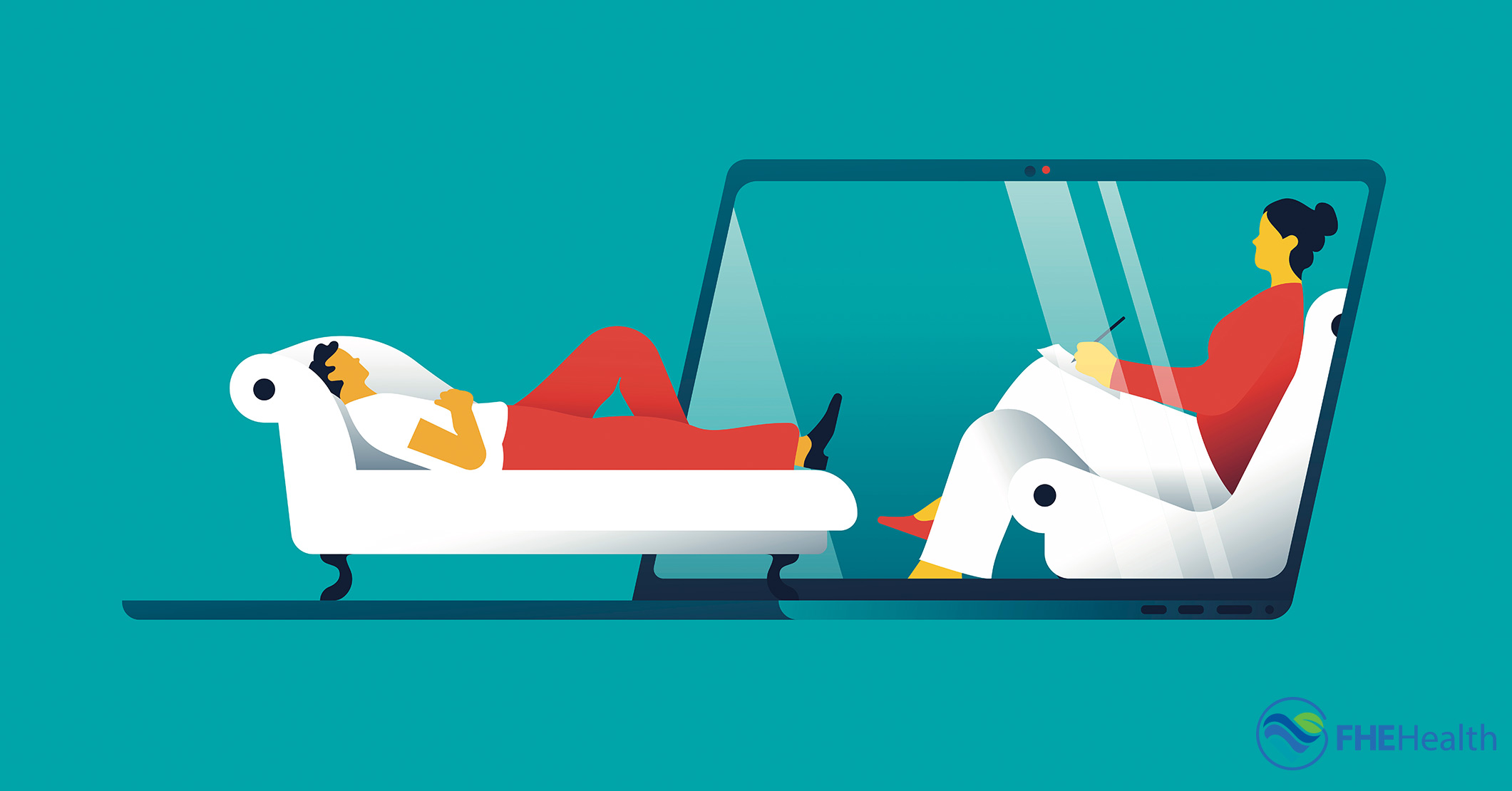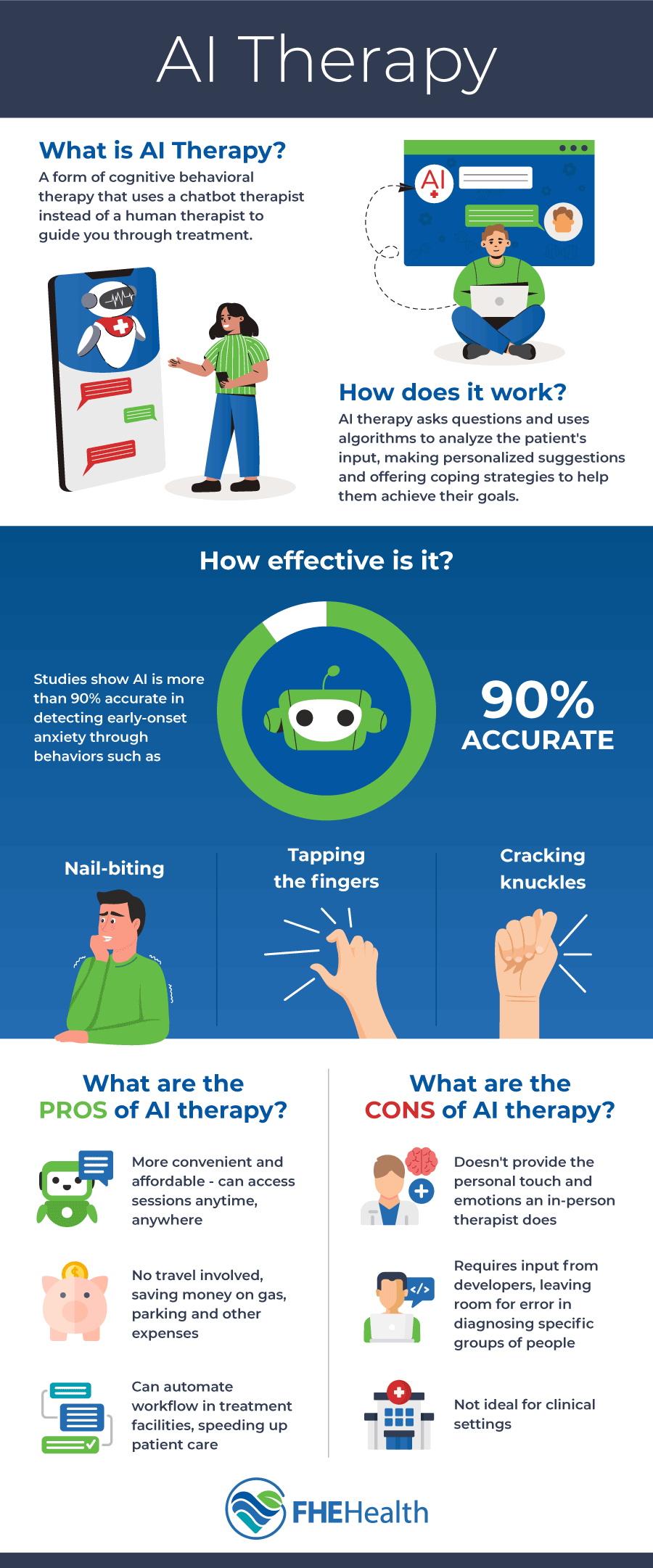
Artificial intelligence, or AI, uses computers or robotics to emulate tasks traditionally performed by humans. Many industries use this advanced technology, including financial services, life sciences, insurance, marketing, education and health care. You’re probably familiar with self-checkout lanes at the grocery store, self-driving cars, automated telemarketing calls, ATMs that complete transactions at your bank and robots that deliver room service in hotels. When AI and mental health treatments combine, the effect is better accuracy in diagnosing illnesses and better treatment plans.
Keep reading to learn how AI benefits mental health care and how it compares to traditional treatments.
Understanding AI Therapy and Its Approaches
AI therapy is a form of cognitive behavioral therapy (CBT) that uses a chatbot therapist instead of a traditional in-person therapist to guide you through treatment. Therapy apps ask questions about your moods, how your day went, how events made you feel and how you reacted. The AI therapists then process and interpret your conversations and behaviors and determine how they affect your mental health. AI therapy uses algorithms to make personalized suggestions and offers coping strategies to help you achieve your goals. Like an in-person therapist, AI therapists track your progress over time to make additional changes to your treatment plan.
Because AI therapy is cheaper than in-person therapy, it can help make treatment more accessible for more people. It’s also accessible from any computer with an internet connection, which makes it possible to receive services anytime from the comfort of your home. Studies have shown that 1 in 4 Americans prefer AI therapy over in-person sessions, and of those individuals who tried AI therapy, 80% say they’re satisfied with the results. Easy access to AI in mental health treatment may actually speed up the therapy process and allow individuals to see quicker results.
Effectiveness of AI Mental Health Therapy in Different Scenarios
Approximately 30% of adults in the United States are diagnosed with some form of anxiety disorder in their lifetime, making it one of the most common mental health disorders. When left untreated, anxiety can affect school and work performance, destroy relationships and cause additional mental health issues. Early detection is vital because it can reduce the risk of depression and substance-abuse problems. Studies have shown that AI is more than 90% accurate in detecting early-onset anxiety using sensors to detect behaviors such as nail-biting, tapping the fingers and cracking knuckles.
AI therapy has also proven successful for patients in recovery. Inpatient treatment for mental health disorders and substance abuse provides a stable environment free from external stressors. Studies have shown 60% of patients treated for depression and 85% of patients treated for drug and alcohol addiction relapse within the first year. AI therapy can bridge the gap and provide support during the first year at home to help prevent relapses before they occur.
AI can group individuals together in peer groups for group therapy sessions and support based on their diagnosis and individual needs. Peer groups create a sense of belonging, foster positive friendships, hold individuals accountable, help increase self-esteem and make it easier to stick with a treatment plan. Using AI, peer groups can send encouraging messages to one another throughout the day and hold emergency intervention meetings.
Comparing AI Therapy to Traditional Therapy
There are many pros and cons of technology on mental health. Traditional therapy involves one-on-one interactions with a therapist in person or virtually, while AI therapy sessions are self-guided via remote tools. AI therapy can be more convenient and affordable because you can access your sessions at any time and from any location. You don’t have to miss work or make arrangements for babysitters. There’s no travel involved, so you save money on gas, parking and other expenses. However, AI doesn’t provide the personal touch and emotions an in-person therapist does.
Patients tend to open up more with an AI therapist about personal information, including drinking habits and sexual activity, knowing a chatbot won’t judge. Open communication allows the AI therapist to get a clearer picture of personality traits and behaviors, which may make therapy more effective.
Since the COVID-19 pandemic, there’s been a decrease in the number of healthcare workers in the United States. Studies have shown that 9 in 10 behavioral health workers have reported burnout, and nearly half of workers say excessive workloads have caused them to consider other employment. AI therapy can help supplement a therapist’s job and lighten the load by summarizing sessions, writing reports and giving health care workers more time to spend with their patients.
The Future of AI Therapy and Its Role in Mental Health Care
In its current form, AI therapy isn’t ideal for clinical settings, and because the technology requires input from mental health app developers, there’s still room for error in diagnosing specific groups of people. AI does have the power to automate the workflow in treatment facilities, which can speed up patient care and reduce the burden placed on health care administrators.
AI has also been proven beneficial when researching conditions and drawing connections between collected data. This can lead to new treatment options, faster recovery times and a greater quality of care, and due to the lack of health care workers, access to AI therapy reduces the wait times for individuals to receive care by as much as 30%. In some cases, this can be critical when dealing with at-risk individuals.







